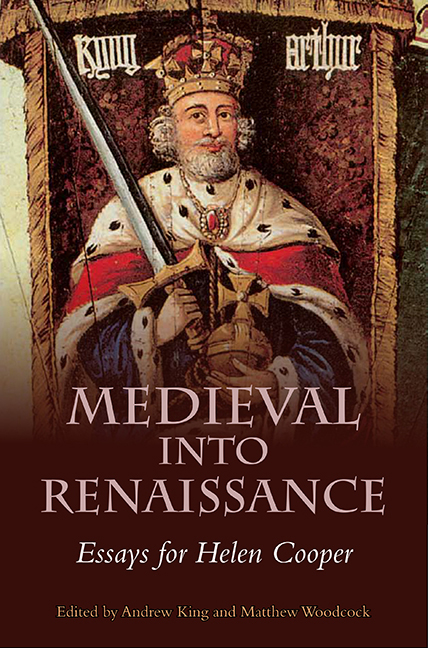Book contents
- Frontmatter
- Contents
- List of Illustrations
- List of Contributors
- Acknowledgments
- Abbreviations
- Introduction
- Unknowe, unkow, Vncovthe, uncouth: From Chaucer and Gower to Spenser and Milton
- Armour that doesn't work: An Anti-meme in Medieval and Renaissance Romance
- ‘Of his ffader spak he no thing’: Family Resemblance and Anxiety of Influence in Fifteenth-Century Prose Romance
- Writing Westwards: Medieval English Romances and their Early Modern Irish Audiences
- Penitential Romance after the Reformation
- The English Laureate in Time: John Skelton's Garland of Laurel
- Thomas Churchyard and the Medieval Complaint Tradition
- Placing Arcadia
- Fathers, Sons and Surrogates: Fatherly Advice in Hamlet
- ‘To visit the sick court’: Misogyny as Disease in Swetnam the Woman-Hater
- The Monument of Uncertainty: Sovereign and Literary Authority in Samuel Sheppard's The Faerie King
- Mopsa's Arcadia: Choice Flowers Gathered out of Sir Philip Sidney's Rare Garden into Eighteenth-Century Chapbooks
- Bibliography
- Index
- A Bibliography of Helen Cooper's Published Works
- Tabula Gratulatoria
Penitential Romance after the Reformation
Published online by Cambridge University Press: 05 July 2016
- Frontmatter
- Contents
- List of Illustrations
- List of Contributors
- Acknowledgments
- Abbreviations
- Introduction
- Unknowe, unkow, Vncovthe, uncouth: From Chaucer and Gower to Spenser and Milton
- Armour that doesn't work: An Anti-meme in Medieval and Renaissance Romance
- ‘Of his ffader spak he no thing’: Family Resemblance and Anxiety of Influence in Fifteenth-Century Prose Romance
- Writing Westwards: Medieval English Romances and their Early Modern Irish Audiences
- Penitential Romance after the Reformation
- The English Laureate in Time: John Skelton's Garland of Laurel
- Thomas Churchyard and the Medieval Complaint Tradition
- Placing Arcadia
- Fathers, Sons and Surrogates: Fatherly Advice in Hamlet
- ‘To visit the sick court’: Misogyny as Disease in Swetnam the Woman-Hater
- The Monument of Uncertainty: Sovereign and Literary Authority in Samuel Sheppard's The Faerie King
- Mopsa's Arcadia: Choice Flowers Gathered out of Sir Philip Sidney's Rare Garden into Eighteenth-Century Chapbooks
- Bibliography
- Index
- A Bibliography of Helen Cooper's Published Works
- Tabula Gratulatoria
Summary
An intellectual history of the English Middle Ages might begin in 1570, when John Foxe first brackets off a ‘middle age’ between the earliest and purest ‘primitive tyme’ of the church and Foxe's own time, an era reformed on those primitive – or first – principles. So far as we know, the plural, ‘middle ages’, was not used until 1605, when John Donne similarly uses the term to represent a chronology of Catholic practice. For both writers, periodisation tracks ‘the Ecclesiasticall Story’; here, the steady pace of human time is punctuated by the shifting progress and regress of the church, not by advances in technology or industry, such as the advent of the printing press, nor by dynastic or political transitions, such as the rise of the Tudors following the death of Richard III in 1485. Another narrative embedded in a history of ideas, running parallel to the fortunes of the English church, is that of humanism and the rebirth of classical literature. Humanism in England stretches back to the 1430s, and indeed back to Petrarch and his followers on the continent, but in 1605, the same year that Donne references the ‘middle ages’ in a theological context, the historian William Camden refers to this same ‘middle age’ in a way that accords with the familiar Renaissance story. It is, he says, an age overcast with ‘thicke fogges of ignorance’ and a period whose poetic remains are not to be taken too seriously. If you want literature of real substance and style, look to writings produced in the ‘more ancient and better times’ of the classical era.
Middle English romance, especially of the more popular variety, may seem to be largely tangential to these broader issues of periodisation, religious reform and intellectual history. It turns out, however, that all press is good press from an antiquarian point of view, as it was precisely their distance from Protestant and humanist values that prompted their inclusion in these larger discourses – as common targets of abuse. C.S. Lewis memorably captures the state of affairs in a comment on Roger Ascham:
Ascham's attack on the Arthurian stories is sometimes called a puritan attack; but Ascham the humanist would have made it whether he were a puritan or not.
- Type
- Chapter
- Information
- Medieval into RenaissanceEssays for Helen Cooper, pp. 91 - 106Publisher: Boydell & BrewerPrint publication year: 2016

